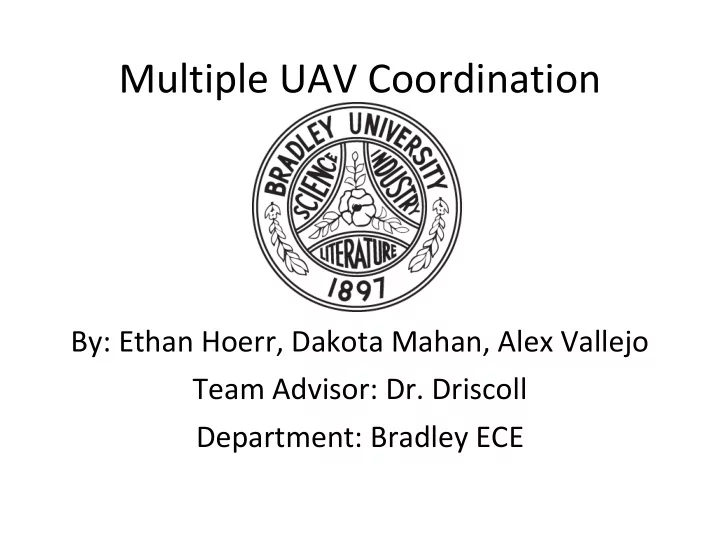

Multiple UAV Coordination By: Ethan Hoerr, Dakota Mahan, Alex Vallejo Team Advisor: Dr. Driscoll Department: Bradley ECE
Purpose • To create an overhead image map of a defined land plot using autonomous Unmanned Aerial Vehicles (UAVs) 2
Background • Advantage of using multiple UAVs • How to coordinate multiple UAVs – Individual flight plans – Wandering until region is cleared – Leader-follower configuration 3
Background • Use of “swarming” or “flocking” coordination scheme • Distribution of task responsibilities based on vehicle capabilities – Leader-follower configuration 4
Previous Work • Research: Coordinated Mapping and Exploration for Autonomous Soaring – Depenbusch and Langelaan, 2011 – Uses multiple UAVs to estimate vertical wind speed of discrete regions in an air space 5
Previous Work • Patent: Multi-UAV dynamic formation control method – Hall, et. al, 2012 for Beijing University of Aeronautics and Astronautics – Establishes method for maintaining multiple UAV formation – Establishes method for obstacle avoidance 6
Previous Work • Research: Flocking with Fixed-Wing UAVs for Distributed Sensing – Quintero et. al, 2013 – Leader-follower configuration for visual ground target tracking – Distributes task responsibilities based on UAV privileges 7
Previous Work • Patent: Controlling unmanned aerial vehicles as a flock to synchronize flight in aerial displays – Stark et. al, 2013 for Disney Enterprises, Inc. – Choreographed air shows – Ground control system uploads flight plan to individual UAVs – Each UAV executes its specific, choreographed flight pattern – Non-swarming 8
Possible Applications • Commercial – Agriculture, civil engineering, professional photography, mapping • Research – Environmental science, tracking natural disasters • Government – Security, defense, intelligence • Search and Rescue 9
Design Constraints & Specifications • Battery power – UAVs must have enough power to complete task • UAV payload – UAVs must fly while carrying any additional equipment • Collision avoidance – People, trees, buildings • Altitude – Advisor Spec: Between 7-20 feet • FAA Limitations – Cannot exceed 400 ft altitude – Must have manual control override 10
Detailed Budget • Four Quad Copters • Four Emitters • Four Receivers 11
The Purchasing Decisions Process • Defining the Problem (Current vs Ideal situation) • Information Search (Internal and External) • Alternative Evaluation (Evaluation Criteria vs. Consideration Set) • Purchase Decision (When & Where) • Post-purchase Behavior (Cognitive Dissonance) 12
Cost-Benefit Analysis(CBA) • Two purposes • To determine if this is a sound investment • To provide a basis for comparing project investments(total expected costs vs total benefits) 13
Economic Analysis • How will this effect the market? • Scarce Resources • Opportunity Costs, Social Costs, and Benefits 14
Gantt Chart • Order Parts (Research) • Interfacing Software • Interfacing Hardware • Complete Assembly • Debugging • Prepare Presentations 15
Progress Presentations • November • February • April 16
Division of Labor Ethan Hoerr Dakota Mahan Alex Vallejo ADC Image Processing Hardware Skywalker Interface with Ardrone setup Logic Analyzing Microcontroller 17
Societal and Environmental Impacts • Who is affected? • What is the affect of our project on natural resources? • Is development of our product safe? • Is the development of our product ethical? • What is the effect of the project on human welfare and on human rights? 18
Societal and Environmental Impacts cont. • What could go wrong? • What is the potential that the outcome of our project will contribute to accidents and harm? • Is our product safe? • How can it be made safer? • Is it safe for children and disabled persons? • Is it easy or likely to be used in an unsafe way? 19
Societal and Environmental Impacts cont. • Can this product be used unlawfully and unethically? • What is the risk to the consumer? • What is our potential liability? • How could customers be made aware of the risks? • How does the risk compare to the present situation in the market? 20
Conclusion • Background • Design Approach & Methods of Solution • Economic Analysis • Division of Labor • Societal & Environmental Impacts 21
Flowchart (Mothership) • Initialize Sensors (IMU & Front Camera) • Manual vs Automatic (Autopilot) • Collision Detection • GPS Waypoints 22
Flowchart (Drones) • Initialize ADC MUX & Sensors (Emitters/Receiver) • Manual vs Automatic (Autopilot) • Sensors • PID Control Loop 23
References • http://en.wikipedia.org/wiki/ Mass_production • http://forum.arduino.cc/index.php? topic=122014.0 24
Multiple UAV Coordination By: Ethan Hoerr, Dakota Mahan, Alex Vallejo Team Advisor: Dr. Driscoll Department: Bradley ECE 25
Recommend
More recommend